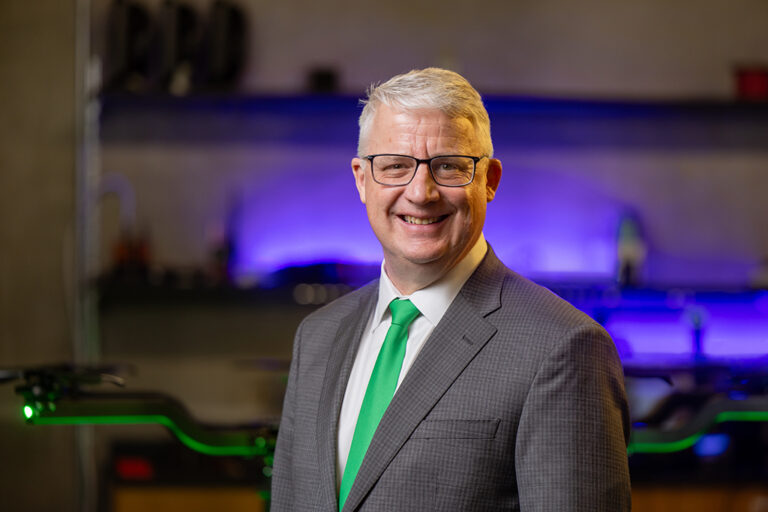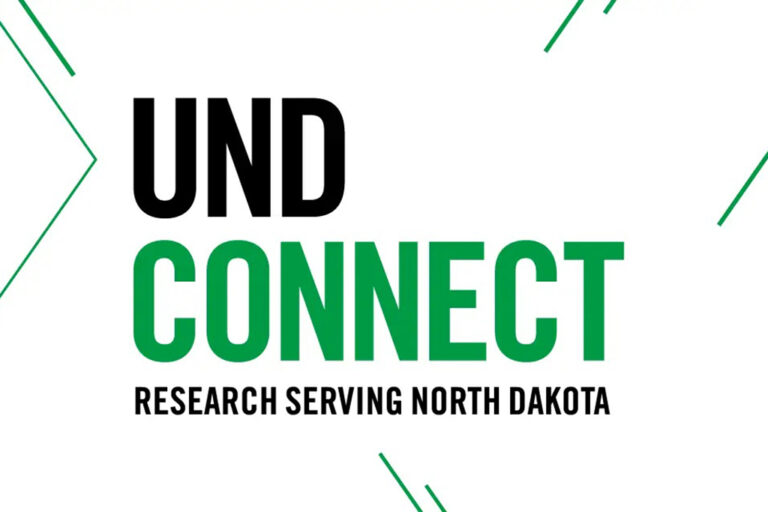Postdocs on lock
Second round of postdoctoral seed funding highlights Grand Challenges and fostering research culture

Chemistry Professor Julia Zhao was monitoring her email diligently on the first day of December.
Refresh after refresh, she still didn’t see what she wanted in her inbox – a notice of a Postdoctoral Funding Award from the office of the UND Vice President for Research and Economic Development (VPRED).
“I thought, ‘I didn’t get it.’ But then I saw this email,” Zhao said with an excited giggle. “My collaborator, Dr. Hui Pu in petroleum engineering, got the email as well. As I was in the process of reading it, he called and said, ‘Dr. Zhao – did you see that we got it!’”
Zhao and Pu were among the 10 UND research teams awarded funding to hire a postdoctoral associate for a two-year period. They were chosen from 39 research proposals – up from the 31 submitted in the program’s first year.
“Frankly, I’d love to be able to fund more,” said VP for Research and Economic Development Grant McGimpsey. “There have been an impressive list of accomplishments so far from the first round of funded postdocs, and that’s something we’re trying to drive.”
For instance, one of last year’s postdoc award recipients, Jyotika Sharma, a UND associate professor in the Department of Biomedical Sciences in the School the Medicine & Health Sciences, just landed her fifth major National Institutes of Health research award since 2011. Her most recent NIH award, a two-year $4000,000 grant, will support her ongoing studies on sepsis – a systemic, life-threatening condition where the immune system’s response to infection or injury damages a body’s own organs.
The idea behind funding postdocs is that the assistance will allow faculty researchers more time to write grant proposals and manage more external funding – an internal investment that pays back.
In the seed program’s second year, McGimpsey’s team prioritized submissions that aligned with the One UND Strategic Plan’s Grand Challenge areas – biomedicine, rural community health and social support, big data production and management, UAS development, and energy and environmental sustainability.
Zhao’s proposal focus was energy, calling for using something incredibly small – nanoparticles – to achieve big gains in North Dakota’s Bakken oil fields. Right now, oil producers can only extract 5-10 percent of the oil underground. The remaining 90 percent is locked inside porous rock.
“Because these nanoparticles are coated with slippery surfactant and because nanoparticles are easy to move, we want to put them inside the oil pores,” Zhao explained. “When they are inside the pores, they try to pull the oil out. Therefore, we can get a lot of the oil moved out of the rock.”
Zhao knows firsthand how much having a postdoc will help in this research. She was one of 10 faculty awarded funding in the program’s inaugural year, and hired an associate for her collaborative research with Diane Darland in the Biology Department.
“We wrote a paper together, and the postdoc not only helped with research, but also with training graduate and undergraduate students. Sometimes my time is limited, and the postdoc spends a lot of time in the lab training them on research,” Zhao said, adding that the support helped her obtain additional external research funding from the National Science Foundation – a $420,000, three-year grant.

Postdoc culture
Fostering a postdoctoral culture is one of many steps the Strategic Plan Goal No. 4 (enhancing discovery and research) team is taking to approach the level of a Carnegie R1 research institution.
“Carnegie R1 universities all have a healthy continuum from undergraduate student to graduate student to postdoctoral researcher to faculty member,” McGimpsey said. “That vertical integration and side-by-side learning are really important components of what makes a university successful from a research perspective.”
In addition to the postdoctoral award, the VPRED is making it easier to get postdocs to campus by examining barriers in the hiring process – a task assumed by Faculty Fellow for Research John Mihelich and Academic Affairs Officer Shannon Mikula.
“It’s competitive to get good postdocs,” Mihelich said. “We’re looking at a way to make the process as efficient as possible.”
As postdoc numbers climb, McGimpsey says, the Carnegie Commission will take note. “The more people you can attract to your university because they want to do research here, the more evident it is that you’re a successful research institution.”
Dean and donor support
The VPRED Postdoctoral Funding Program is a partnership with the college deans, who contribute to the second year of the selected postdoc’s term.
McGimpsey said that when the program was set up, his office wanted to make sure that the awards were consistent with the research goals of the deans.
“I’m excited by the enthusiasm that the deans have shown about this program,” McGimpsey said. “It’s difficult for deans to find dollars to make this kind of commitment. At the same time, they are making the commitment, which says a lot about their interest in boosting research.”
The UND Alumni Association & Foundation is also lending support in this second round, showing donors and friends the substantial ways in which they can help effect positive societal change through UND’s research.
Sowing seeds
This program is one of several seed funding programs for research currently under way at UND. The VPRED also funds an Early Career Award Program, which helps pre-tenure, tenure track faculty with research efforts to build their portfolios. Seed programs have also grown out of four of the five Grand Challenge areas.
Among all of these programs, UND faculty have written more than 100 research proposals over the past five months.
“This is to access what, in some cases, is a very lucrative award. But in other cases, the faculty are just saying, yes, I want to see what kind of collaborative opportunities I can get out of this,” McGimpsey said.
Zhao’s oilfield opportunity came in through email – but the results of that opportunity will ripple and disseminate in a grander way.
“At UND, people have a passion to help with the nation’s energy problems. And they’re giving us a lot of support.” she said. “They’re not only just saying it – they’re doing it.”
2017-2018 Postdoctoral Seed Funding Awardees:
- Manu (PI), Biology / Yen Lee Loh (Co-PI), Physics & Astrophysics
– Proposal: Data-Driven Inference and Modeling of Stem Cell Gene Regulatory Networks - Julia Zhao (PI), Chemistry / Hui Pu (Co-PI), Petroleum Engineering
– Proposal: Development of Novel Nanoparticle-Surfactant based Fluid for Enhanced Oil Recovery in Bakken Formation - Alena Kubatova (PI), Chemistry / James Moe (Co-PI) Aviation
– Proposal: Unmanned Aerial Vehicle Sampling of Carbonaceous Atmospheric Aerosol - Gautham Krishnamoorthly (PI), Chemical Engineering / Joshua Stanislowski; Prakash Ranganathan (Co-PIs), EERC; Electrical Engineering
– Proposal: Syper-Critical CO2 Cycle Design and Analytics: A Disruptive Technology for North Dakota Lignite Coal Utilization - Prakash Ranganathan (PI), Electrical Engineering / Will Semke; Nick Wilson; Travis Desell (Co-PIs), Mechanical Engineering; Aviation; Computer Science
– Proposal: “Electronic Systematic Corruption of Remotely-Piloted hosTile UAS” (ESCORT-UAS), a Multi-Tier, Rapid Deployment Proximity-Based Counter-UAS System - Kouhyar Tavakolian (PI), Electrical Engineering / Jau-Shin Lou; Colin Combs (Co-PIs), Neurology; Basic Sciences
– Proposal: Towards an Unobtrusive System for Assessing Orthostatic Hypotension and Fall in Parkinson’s Disease Patients - Gretchen Mullendore (PI), Atmospheric Science
– Proposal: Determination of Regional Convective Detrainment Levels to Improve Convective Parameterizations in Global Weather and Climate Models - Catherine Brissette (PI), Biomedical Sciences / Archana Dhasarathy; Junguk Hur (Co-PIs), Biomedical Sciences
– Proposal: Exploring Epithelial to Mesenchymal Transitions in Lyme Arthritis Through a Systems Approach - Sergei Nechaev (PI), Biomedical Sciences / Archana Dhasarathy; Yen Lee Loh (Co-PIs), Biomedical Sciences; Physics and Astrophysics
– Proposal: Transcriptome-Wide Responses of Human Cells to Heat Shock Stress Analyzed by Experimentally Informed Mathematical Modeling - Othman Ghribi (Co-PI), Biomedical Sciences / Donald Jurivich (Co-PI), Geriatrics
– Proposal: Fatty Acid Regulation of Transcriptional Switches Controlling Neuroprotection in Alzheimer’s Disease


